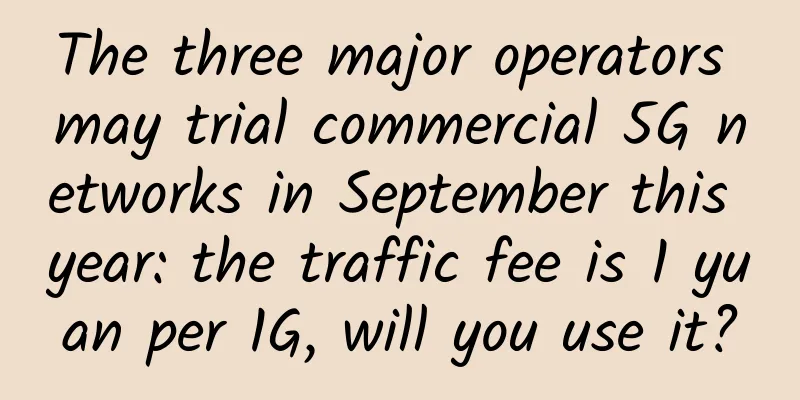The three major operators may trial commercial 5G networks in September this year: the traffic fee is 1 yuan per 1G, will you use it?

|
On March 10, China Mobile announced that by the end of September this year, Shanghai will have completed the construction of no less than 5,000 5G base stations across the city (China Mobile will also achieve full 5G network coverage within Beijing's Fifth Ring Road before the end of the year), and the corresponding 5G network trial commercial activities are expected to start simultaneously. In addition to Shanghai, China Mobile's first batch of 5G network test cities will also carry out such operations simultaneously.
Similar to China Mobile, China Unicom and China Telecom will also start trial commercial use of 5G networks in the same period. If everything goes well, users in many cities across the country will be the first to feel the charm of 5G networks in September, and the corresponding 5G mobile phones will also be available for purchase by then. In fact, on January 10 this year, Miao Wei, Minister of Industry and Information Technology, said in an exclusive interview with CCTV reporters: China will promote 5G commercially this year, some regions will issue 5G temporary licenses, and 5G mobile phones, 5G iPads and other commercial products will be used in the second half of the year. According to the plan, China's 5G will be pre-commercialized in 2019 and officially commercialized in 2020. China Mobile's 5G network advancement speed: At the 5G Innovation and Cooperation Summit on December 8 last year, China Mobile officially announced that it would launch 5G scale trials and application demonstrations in 17 cities in China, including: Hangzhou, Shanghai, Guangzhou, Suzhou, Wuhan, Beijing, Chengdu, Shenzhen, Qingdao, Tianjin, Fuzhou, Nanjing, Guiyang, Shenyang, Zhengzhou, Wenzhou, Ningbo, and the construction of a commercial 5G network will be completed in China in the third quarter of this year. The construction of a commercial 5G network will be completed in China in the third quarter. China Unicom's 5G network advancement speed: In the early stage of 5G network construction, a total of 16 cities were simultaneously carrying out the construction, namely Beijing (and Xiong'an), Wuhan, Qingdao, Tianjin, Nanjing, Shanghai, Hangzhou, Fuzhou, Shenzhen, Zhengzhou, Chengdu, Chongqing, Guiyang, Guangzhou, and Shenyang. At present, the first batch of 5G test machines have been delivered, and the 5G terminal NSA trial commercial use and the release of 5G new terminals are expected to be launched in the second quarter; 5G commercial terminals will be launched on a large scale in the fourth quarter of 2019. China Telecom's 5G network advancement speed: There are currently six pilot cities, namely Shanghai, Suzhou, Chengdu, Lanzhou, Shenzhen, and Xiong'an. More cities may be added in the future, but these six will still be the main focus in the early stages. In March, more than 1,200 5G terminals (including mobile phones) will be launched for testing in preparation for upcoming commercial use. How will domestic 5G frequency bands be divided? Judging from the currently allocated 5G experimental spectrum, China Unicom and China Telecom have great early advantages. They have obtained 100MHz spectrum resources near the 3.5GHz band, which is the current golden frequency band for 5G networks. In addition to reducing the cost of building base stations, it also has support from many mature terminals and is compatible around the world. China Mobile has acquired a total of 300MHz of spectrum resources in the 2.6GHz and 4.9GHz frequency bands. As they have stronger financial strength, they will have to spend more energy and financial resources to build base station equipment in the corresponding frequency bands to improve coverage. For example, 4.9GHz is currently a blank. When will we be able to use 5G mobile phones? It is not enough to have a 5G network without the corresponding mobile phones to support it, otherwise South Korea would not have postponed the launch of the 5G mobile network originally planned for March. At present, Qualcomm and Huawei have announced their own 5G baseband modules, Huawei and Samsung have also announced corresponding 5G mobile phones, and domestic mobile phone manufacturers such as OPPO, vivo and Xiaomi are also actively preparing for the development of 5G mobile phones. For operators, they are now testing and matching terminals with networks. It is expected that in June this year, the first batch of 5G mobile phones will be available for purchase. However, the three major operators have hinted that the corresponding terminal costs will be very high because the industrial chain of 5G networks is not yet mature. In addition, the first batch of 5G mobile phones are positioned as flagships, so the initial price will not be less than 8,000 yuan. When 5G mobile phones are truly popular, it will take until 2020 at the earliest. It must be pointed out that if you want to use the 5G network, you must change your phone. The current 4G mobile phone does not support the network (the mobile phone number does not need to be changed), but the reverse is true. 5G network phones are backward compatible with 4G networks. 5G network is commercially available, with traffic fee of 1 yuan per GB. Will you use it? Previously, Zhang Yunyong, president of China Unicom Research Institute, said in an interview that 5G mobile phone charges will only gradually become cheaper than 4G, and will not be more expensive than 4G. The reason for this is still related to the 5G network itself. Under the faster network, ordinary users are just the foundation, and the profit source of operators is obtained from enterprises. Although 5G has not yet been commercialized and no specific rates have been released, China Mobile and China Telecom both agree with China Unicom's view that 5G network traffic charges will be cheaper than 4G. Previously, China Mobile's official Weibo account even said that 5G charges will not be expensive and everyone can afford it. Gao Tongqing, deputy general manager of China Telecom, once said that the charges under 5G network can be divided into many categories, such as large-volume billing for VR, 8K high-definition live broadcast, video surveillance, etc., dynamic billing for live broadcasts for sports, concerts, etc., and basic billing for the traffic used by general users, etc. Therefore, the charging scope of smartphones using 5G network will continue to be based on the sufficient cost-effective model, and the real source of profit is to charge different fees according to the different needs of corporate users. This also basically gives the profit model of operators under 5G network, and the profit comes from enterprises. In addition, some communications industry experts emphasized that since the base stations of 5G networks can carry more traffic (compared to 4G networks), the price of each 1G of traffic may be only 1 yuan or even 50 cents, and there will be no situation where people cannot afford it. We can still look forward to the cheap 5G network traffic fees. 5G rates are cheap, but your total data usage will also increase With faster network speeds, your total traffic usage is also on the rise, which is inevitable. At the China Mobile 5G Forum last year, Zhu Hanwu, deputy general manager of Guangdong Mobile, said that in the early stage of 4G construction, China Mobile's average DOU (average monthly traffic usage per capita) was about 2G. With the further development of the 4G network, this number was upgraded to 4G, and the DOU in 2018 has exceeded 8G, and it is expected to reach 15G this year. It can be seen that with the increase and improvement of network speed, users' enthusiasm for using traffic is exploding. Of course, this is also due to the increasingly powerful 4G tariffs of the three major operators. Regarding the upcoming 5G network, the user traffic will surge after its commercialization. In this regard, Zhu Hanwu, deputy general manager of China Mobile, said that the DOU (average monthly traffic usage) under the 5G network is at least 60G, and it is even higher than this in actual operation. This indicator is just a reference value. So we must clearly realize that although the price per GB is cheaper under the 5G network, it may still not be too cheap after the total amount you use increases. |
<<: The first interpretation in China: the potential game-changer behind IIoT
>>: Perhaps it is easier to understand HTTPS this way
Recommend
SpartanHost: 1TB large hard disk VPS starts at $6/month, 10Gbps large bandwidth high-security VPS starts at 20% off $4/month
SpartanHost, also known as Sparta, is a foreign h...
Eight surprising ways remote work can help your business
The rise of remote work is arguably the biggest c...
Why is 50 ohms used in RF?
[[416676]] In RF circuits, RF devices with variou...
Network packet loss troubleshooting solution
1. Location and processing of network packet loss...
HostKvm is now 30% off in Korea, dual core/4G memory/40G hard disk/1.2T traffic/monthly payment of $7.35
HostKvm is a Chinese VPS service provider founded...
CDN price war aside, P2P regains attention. Who is the driving force behind this?
Without talking about the price wars that have re...
Deutsche Telekom CEO blasts OTT: generating 80% of traffic but not paying a penny for infrastructure
According to Mobile World Live, Deutsche Telekom ...
How to build supply chain finance modernization from Shengye
The report of the 20th National Congress of the C...
What to do when you encounter a network failure? Teach you a trick to use route tracking to locate the fault point
In the Internet world, we interact with various n...
Operator workers: What are your plans after receiving your year-end bonus?
It’s the end of the year again. Regardless of whe...
VMISS 30% off, starting from $2.6/month, Hong Kong/Japan/Korea/Los Angeles CN2 GIA/AS9929/CMIN2 and other computer rooms
VMISS (Virtual Machines Innovative Solutions) was...
CAP, can it be without P? Did you know?
Hello, everyone, I am Zhibeijun. Almost all large...
The development trend of deception defense from the perspective of new honeypot technology
As attack and defense exercises become more and m...
In response to the five major trends of application modernization in the financial industry, consistent delivery experience is the key
With the rapid development of digital technology,...
VULTR Launches Free VPS Plan
VULTR released information about the launch of a ...









